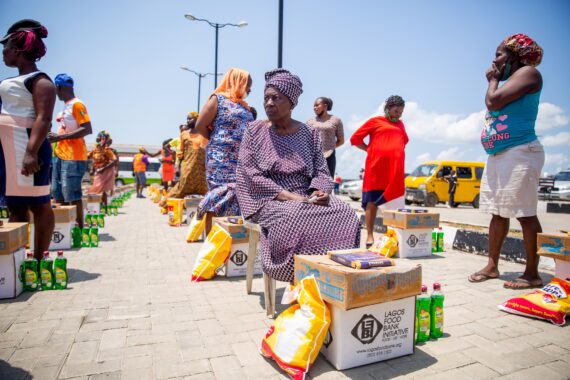By Abiola Afolayan
Bread for the World’s approach to realizing its mission has been molded by Dr. King’s ideas and campaigns since our founding in 1974. Here we describe some of the ways Bread is striving to honor Dr. King’s legacy by our actions.
On December 10, 1964, in Oslo, Norway, Dr. King was awarded the Nobel Peace Prize for his “nonviolent struggle for civil rights” for African Americans. Dr. King said that his understanding of peace came from God. He noted that Gandhi’s theory of nonviolence, seen “in action” in the successful campaign he led to win India’s independence, was an inspiration to him. Gandhi said that when people are in conflict, the philosophy of nonviolence rejects the influence of revenge and emphasizes love for other human beings.
Dr. King emphasized that it is important to create alliances, despite our differences. He urged a collective refusal to accept despair or the cynical belief that we cannot create change. It is possible for all people to have three meals a day as well as dignity and equality. Faith can give us the strength to face the unknown.
King consistently pointed out that this does not mean victories will come easily. In his 1963 Letter from Birmingham Jail, written by hand while he was imprisoned for nonviolent protest of racial segregation, he articulates his thoughts and emotions about poverty and inequity: “… Human progress never rolls in on wheels of inevitability. It comes through the tireless efforts of [humans], willing to be co-workers with God, and without this hard work time itself becomes an ally of the forces of social stagnation.” The Birmingham letter is now part of the U.S. Congressional Record.
In November 1967, Dr. King launched the Poor People’s Campaign in partnership with the Southern Christian Leadership Conference (SCLC). The Campaign mobilized poor people from all over the United States to meet with officials in Washington, DC, and demand access to decent jobs as essential to upholding their human rights to food and dignity.
King described the Campaign as “the beginning of a new co-operation, understanding, and a determination by poor people of all colors and backgrounds to assert and win their right to a decent life and respect for their culture and dignity.” Many leaders from American Indian, Puerto Rican, Mexican American, and low-income white communities joined King and other African American leaders in committing to the Poor People’s Campaign and its goals.
King’s work clearly remains influential in contemporary social justice and advocacy efforts. The values of lifting up God’s love for humanity, making active efforts to work with others who may not agree with us on everything, and promoting respect for human rights and dignity are just three of those Bread shares with Dr. King and works to uphold. We also have learned from Dr. King strategies such as learning from the successes of others who came before us, engaging directly with decision makers, using our lived experiences to explain why change is needed, and building a movement that is broad, inclusive, and committed to racial and gender equity. Bread’s work, particularly the Offering of Letters and associated calls and visits to members of Congress, is in the tradition of our country’s long history of vigorous citizen and civil society advocacy.
At this juncture in national politics, Bread is encouraged by our success in winning bipartisan support for an effort to reduce human suffering around the world. The bill, the Global Malnutrition Prevention and Treatment Act of 2021, includes measures to save children’s lives and futures by reducing malnutrition, a major threat to both. This is a sign of hope as we commemorate Dr. King’s birthday.
Abiola Afolayan is senior international policy advisor with Bread for the World.
![Photo credit: Library of Congress, Prints & Photographs Division, NYWT&S Collection, [reproduction number, e.g., LC-USZ62-111157]](https://www.bread.org/wp-content/uploads/2022/01/5332424980_3cf4159ee2_o-875.jpg)


